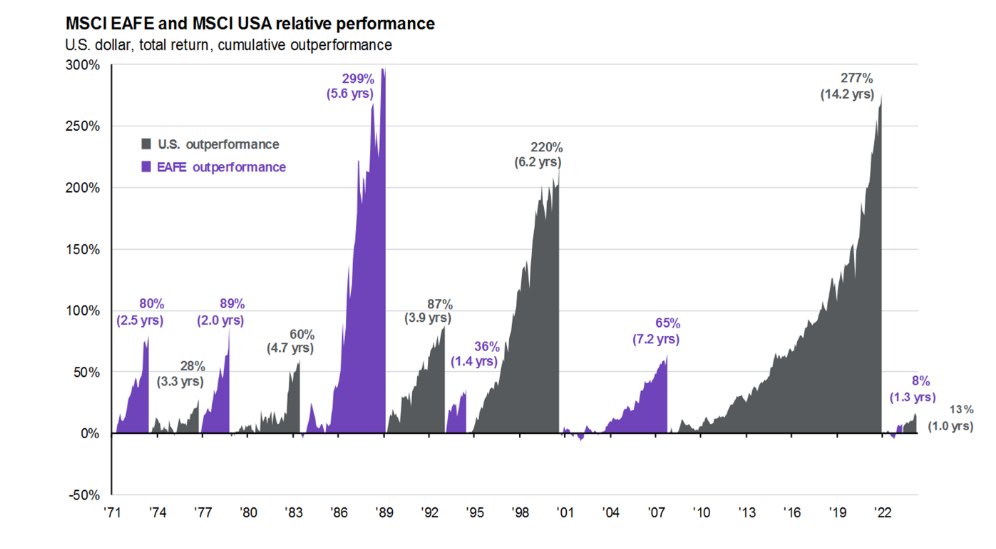In recent years, many investors have questioned the value of international diversification, given the U.S. stock market’s outstanding performance since the Great Financial Crisis. With the U.S. stock market significantly outpacing international markets, it’s understandable why some might feel international diversification is unnecessary. However, this perspective might be too narrow.
The U.S. Market’s Dominance
Since 2009, the U.S. stock market has delivered impressive returns, with a total U.S. stock market index fund up over 660%, compared to around 180% for a total international index fund. This dominance can be attributed to various factors such as a larger tech sector, a strong dollar, and a more favorable regulatory environment. Additionally, many large U.S. corporations generate a substantial portion of their sales and earnings from overseas markets, further strengthening the case for investing solely in the U.S.
But does this mean international diversification is obsolete?

The Case for International Diversification
Despite the U.S. market’s recent success, there are compelling reasons to consider international diversification. Historical performance is not a reliable indicator of future performance. The stock market is cyclical, and the best-performing market in one decade may not be the best-performing market in the next. For instance, U.S. stocks performed poorly in the 1970s and 1980s, highlighting the importance of diversification across different regions and markets.
At Intelligent Investing, we believe in the value of a diversified portfolio that spans the globe, echoing the investment philosophies upheld by the CFA Institute. Diversification helps mitigate risks inherent in concentrating investments in a single market, which can be prone to specific economic, political, and financial factors.
Risk Management and Potential Opportunities
Diversification isn’t just about mitigating risk; it’s also about uncovering new investment opportunities. By diversifying globally, investors can potentially benefit from the growth of emerging markets and other regions that may outperform the U.S. market in the future. As legendary investor Peter Bernstein once said, “I view diversification not only as a survival strategy but as an aggressive strategy because the next windfall might come from a surprising place.”
Emerging markets, for instance, offer growth potential that is often unmatched by developed markets. Countries in Asia, Latin America, and Africa are experiencing rapid economic growth, increasing urbanization, and favorable demographic trends. These factors can drive higher returns in the long term. Moreover, investing in international markets allows investors to capitalize on different economic cycles, currency fluctuations, and industry trends that might not be present in the U.S. market.
Conclusion: Embracing a Global Perspective
While the U.S. stock market has been a strong performer in recent years, history has shown that market leadership can change. International diversification remains a prudent strategy for managing risk and potentially uncovering new investment opportunities. By diversifying across different regions and markets, investors can position themselves to navigate the uncertainties of the global economy and capitalize on the growth of diverse markets.
At Intelligent Investing, we stand by our commitment to act in our clients’ best interests at all times, providing holistic and personalized investment strategies. By embracing a global perspective and diversifying investments, we help ensure that our clients are well-positioned for the future, no matter where the next market windfall may come from.
International diversification is not just a theoretical concept but a practical approach to building a resilient and growth-oriented investment portfolio. It’s about being prepared for the ever-changing dynamics of the global economy and seizing opportunities wherever they arise. So, let’s look beyond the U.S. market dominance and embrace the benefits of a globally diversified portfolio.
Credits: This blog was written in part by ChatGPT, an AI language model developed by OpenAI. The content of this blog reflects the knowledge and opinions of ChatGPT, may or may not reflect the knowledge and opinions of Intelligent Investing, and is protected by copyright laws. Please do not reproduce or distribute without giving proper credit to ChatGPT and OpenAI.




